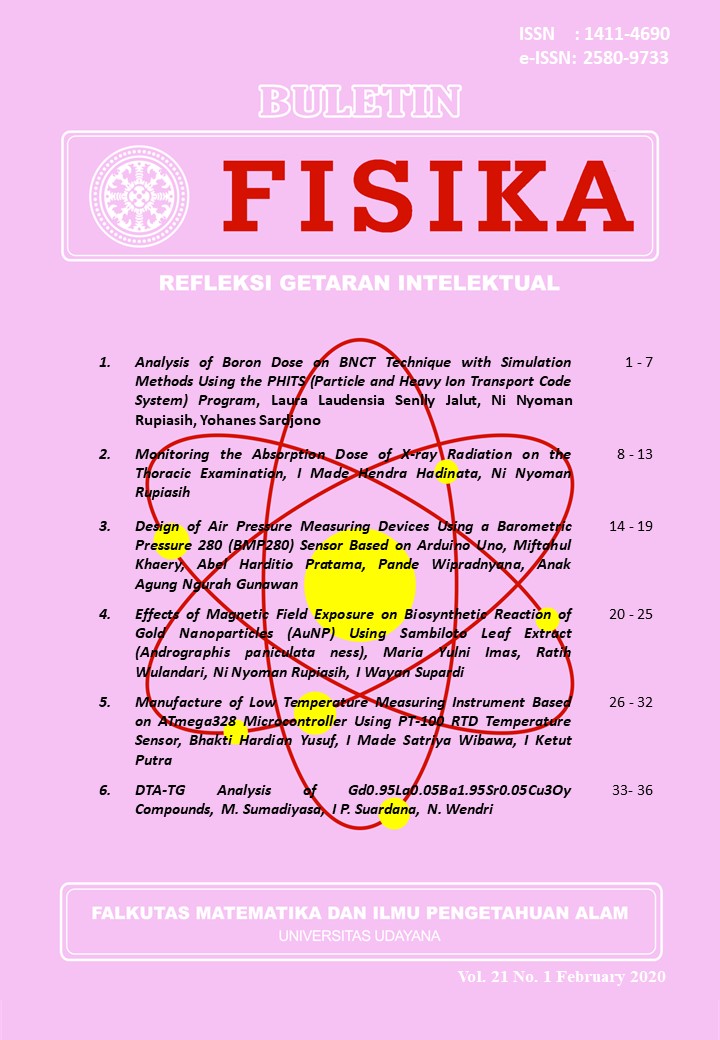Effects of Magnetic Field Exposure on Biosynthetic Reaction of Gold Nanoparticles (AuNP) Using Sambiloto Leaf Extract (Andrographis paniculata ness)
Abstract
Research has been conducted to determine the effect of magnetic field exposure on the biosynthesis reaction of gold nanoparticles (AuNP) using Sambiloto leaf extract (Andrographis paniculata ness). The observations were made in two stages, namely optimization and synthesis rate. The optimization stage is carried out in a variation of the synthesis ratio (AuCl 3 solution (in ?l): Sambiloto leaf extract (in ml)) which are 2:10, 5:10, 10:10, 15:10, 20:10, 30:10 and 40:10. The results obtained from the optimization stage are used at the stage of determining the rate of synthesis reaction and then used to study the effect of magnetic field exposure on the rate of the AuNP synthesis reaction. The magnitude of the magnetic field used is 1.5 mT and exposure time of 12 hours. The synthesis results were characterized using UV-Vis spectrophotometer with the result that the absorbance value is a function of the wavelength of Surface Plasmon Resonance (SPR). The optimization phase was obtained that the synthesis volume ratio of 30 ?l: 10 ml gave the greatest absorbance value for the synthesis time of ± 1 hour. The reaction rate stage was obtained that the optimum time for AuNP synthesis was 1 hour both without and with the effect of magnetic field exposure, with the characteristic wavelength of the SPR and its absorbance value without the field of 535.5 nm, 0.938 a.u. and with a field of 526.0 nm, 0.880 a.u.
Downloads
References
[2] Apriandanu dkk, Sintesis Nanopartikel Perak Menggunakan Metode Poliol Dengan Agen Stabilisator Polivinilalkohol (PVa), Jurnal Jurusan Kimia Fakultas MIPA Universitas Negeri Semarang, 2013.
[3] Babayi, H., Kolo I, Okogun, J. I, Ijah, U. J. J, The Antimicrobial Activities Of Methanolic Extract Of Eucalyptus Camaldulensis And Terminalia Catappa Againt Some Pathogenic Microorganisems, An Int. J. Niger. Soc. For Experiment. Bio, Nigeria, vol. 16, no. 2, 2004, pp. 106-111.
[4] S. R. Purnomo, N. N rupiasih, dan M. Sumadiyasa, Studi Sintesis Nanopartikel Perak Dengan Metode Biologi Menggunakan Tanaman Sambiloto (Andrographis Paniculata Ness), Jurnal Jurusan Fisika Fakultas MIPA Universitas Udayana, 2016.
[5] I. A. P Inten Gayatri, N. N rupiasih, dan M. Sumadiyasa, Rancang Bangun Pembangkit Medan Magnet Homogen Untuk Aplikasi Dalam Pembuatan Membran, Buletin Fisika, vol. 2, no 1, 2019, pp. 1-2.
[6] R. A. Sekarsari, dan T. Taufikurrohmah, Sintesis Dan Karakterisasi Nanogold Dengan Variasi Konsentrasi HAuCl4 Sebagai Material Antiaging Dalam Kosmetik, Prosiding Seminar Nasional Kimia Unesa, 2012.
[7] Saiful F, Sintesis Nanopartikel Perak Menggunakan Biorduktor Ekstrak Aquades Buah Jambu Biji Merah (Psidium Guajava L) Dan Iradiasi Microwave, Skripsi, Jurusan Kimia Fakultas Matematika Dan Ilmu Pengetahuan Alam Universitas Negeri Semarang, 2016.
[8] P. A. L. Hawa, Alat Ukur Distribusi Medan Magnet Pada Kumparan Helmholtz, Skripsi, Program Studi Fisika Fakultas Matematika Dan Ilmu Pengetahuan Alam Universitas Indonesia, 2011.
[9] A. C. Sovawi, Harjono dan S.B.W. Kusuma, Sintesis Nanopartikel Emas Dengan Bioreduktor Ekstrak Buah Jambu Biji Merah (Psidium Guajava L), UNESA J.Chem, vol. 5, no. 3, 2016, pp. 170-173.
[10] Asep Rohiman, Buchari, M. Bachri Amran, Endang Juliastuti dan Irman Idris, Sintesis Karakterisasi dan Aplikasi Gold Nanoparticles (AuNPs) Pada Penumbuhan Silicon Nanowires (SiNWs), Research and Development on Nanotechnology in Indonesia, vol. 1, no. 2, 2014, pp. 74-82.
[11] M. S. Lembang, Maming dan M. Zakir, Sintesis Nanopartikel Emas Dengan Metode Reduksi Menggunakan Bioreduktor Ekstrak Daun Ketapang (Terminalia Catappa), Jurusan Kimia FMIPA Universitas Hasanuddin, 2014, pp. 1-10.
[12] Y. Octaviana, M. Zakir dan I. Raya, Sintesis Nanopartikel Emas Dengan Bioreduktor Ekstrak Daun Belimbing Wuluh (Averrhoa Bilimbi L) Yang Dimodifikasi 2,4,6-Titiol-1,3,5-Triazin Untuk Sensor Melamin, Program Studi Kimia FMIPA Universitas Hasanuddin 2016, pp. 2-7.











